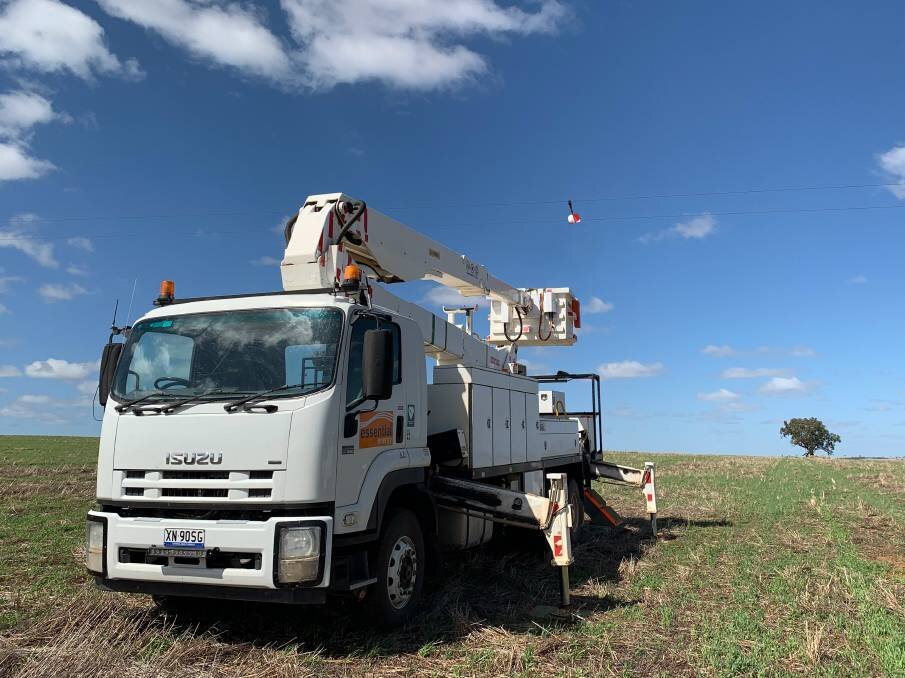NSW - Rebate on overhead powerline markers offered to farmers in bid to improve safety
Support for farmers
The NSW government and energy providers have announced support for farmers to install overhead powerline markers on their property in a bid to improve safety.
SafeWork NSW will offer landholders a $500 small business rebate towards the cost of the markers if they complete an eligible SafeWork event or visit.
While Essential Energy, whose energy footprint covers 95 per cent of NSW, has committed to offering free labour to install a maximum 10 markers on each customer's property, allowing them to save up to $1000 each.
Essential Energy know aerial markers work, they have never had a safety incident on a powerline where they have installed these markers,"
You have to be able to see markers within 400 metres for them to be compliant but because these markers spin, in the slightest breeze, you can see the Balmoral marker from about a kilometre away
SafeWork Australia COVID Vaccination Guidance
Employers have a duty under the model Work Health and Safety (WHS) laws to eliminate, or if that is not reasonably practicable, minimise the risk of exposure to COVID-19 in the workplace.
This page provides information about your obligations under the model WHS laws and how these relate to COVID-19 vaccines. This information will assist you to assess whether a COVID 19 vaccine is a reasonably practicable control measure to manage the risks of COVID-19 in your workplace. However, while this is a decision you will need to make taking into account your workplace, most employers will not need to make vaccination mandatory to comply with the model WHS laws.
A safe and effective vaccine is only one part of keeping the Australian community safe and healthy. To meet your duties under the model WHS laws and minimise the risk of exposure to COVID-19 in your workplace, you must continue to apply all reasonably practicable COVID-19 control measures including physical distancing, good hygiene and regular cleaning and maintenance and ensuring your workers do not attend work if they are unwell. You must also comply with any public health orders made by state and territory governments that apply to you and your workplace.
The national rollout of COVID-19 vaccines
The Australian Government is committed to providing all Australians with access to free, safe and effective COVID-19 vaccines. While the Government aims to have as many Australians as possible choose to be vaccinated, receiving a vaccination is voluntary. You can encourage your workers to get a COVID-19 vaccination, if they are able to.
Eliminating farm deaths must be driven by grassroots programs says new blueprint
A new 24-page national farm safety blueprint has set an extremely ambitious target to cut farm deaths to zero by 2030. Currently annual farm deaths have averaged circa 60 the last ten plus years.
The National Farm Safety Education Fund Strategy released by Farmsafe Australia aims to reduce national on-farm fatalities averaging 60 deaths the last ten years.
Agriculture is an inherently dangerous workplace, particularly for males who represent almost 90 per cent of non-intentional farm deaths.
And half the males killed in farm accidents are over 50 years of age.
Farmsafe Australia also acknowledged the increasing focus on farm safety was partly due to industrial manslaughter laws that have already been implemented or are being considered in some states. (Qld, Victoria, ACT, WA and NT)
Its chairman Charles Armstrong, a farmer from Nyngan in central west NSW, said agriculture needed to change its attitude to work health and safety practices.
"In the past decade there have been more than 600 fatalities on Australian farms. While it may not be realistic to cut this number to zero in the coming decade, we shouldn't be aspiring for anything less," he said.
Mr Armstrong said the strategy was not simply about safer systems but also about creating safer farmers by shifting attitudes towards better practices.
Mr Armstrong said the federal government had dedicated a further $1.6 million in funding for farm safety during the next three years which meant the roll-out of the strategy could start immediately.
The strategy identified five key targets for further investment:
Leadership and cultural change;
The next generation of farmers;
Physical and psychological well-being;
Industry endorsed training and continued learning; and
Evidence and incentivisation.
The safety blueprint also tackled the need to reduce farm fatalities among children under 15 years who now accounted for around 15pc of deaths.
It recommended the development of a national farm safety curriculum to be delivered in high schools across Australia.
Spending on farm safety equipment and training had a financial upside, the strategy said, but farmers also needed to be rewarded with incentives such as rebates on equipment purchases or reductions in insurance premiums.
Farmsafe Australia will report annually, through the Safer Farms Report, to measure performance against the strategy and to ensure delivery of programs and initiatives that genuinely increase safety on farm.
Federal Agriculture, Drought and Emergency Management Minister David Littleproud said the strategy was an important step towards safer farms for farmers, their families and communities.
"This strategy sets a long-term course to improve farm safety."
For any assistance please do not hesitate to contact us.

